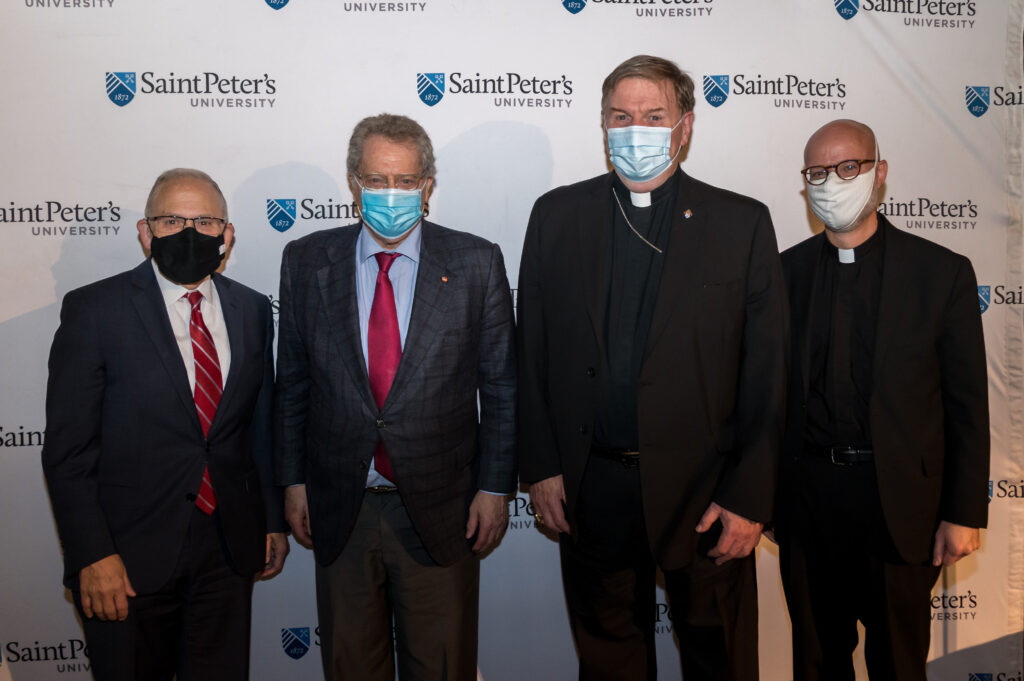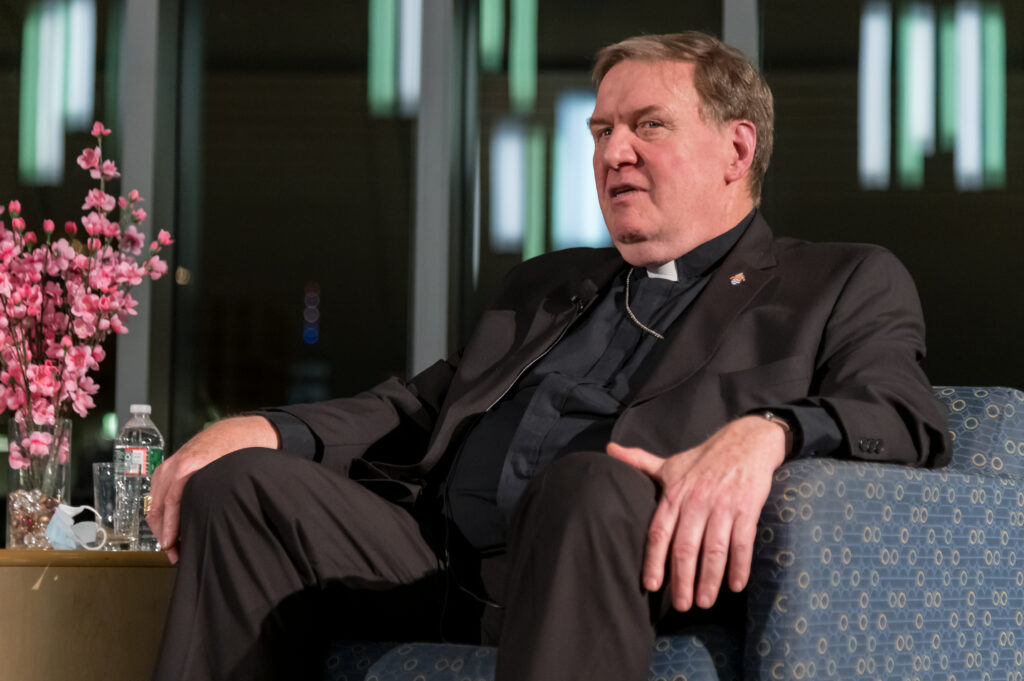On October 28 Saint Peter’s University hosted a conversation between Cardinal Joseph W. Tobin, C.Ss.R., Archbishop of Newark; and Sir Gilbert Levine, an American conductor who came to be known as the “Pope’s Maestro” due to his relationship with Pope John Paul II. The event, Living Friendship and Community in a Divided World, was held as part of the John Tagliabue ’67, H ’05 Lecture Series.
Rev. Alexander Santora of The Jersey Journal attended the event and wrote an in-depth article about it for the Sunday edition of the newspaper, which was also published on NJ.com.
Here the complete article:
What could a Catholic cardinal and a Jewish symphony conductor possibly have in common?
A baton, for one. Or the way it works.
Joseph Cardinal Tobin and Sir Gilbert Levine shared this idea and many more common experiences in their conversation on “Living Friendship and Community in a Divided World” before some 80 guests at St. Peter’s University in Jersey City last Thursday evening. It was part of the John Tagliabue Lecture Series for the university’s 150th anniversary celebration.
Tobin and Levine’s warm friendship grew out of their work at the Vatican, where both toiled in their respective fields for a number of years.
After starting out in an uneven manner, the dialogue evolved into a heart-warming, humor-filled conversation that could have gone on longer. The two men mostly shared how their contact with the other’s religion changed their lives.
Levine, a Brooklyn native, became known as the “Pope’s Maestro” after he went to live in then-Communist-controlled Poland to conduct the Krakow Philharmonic Symphony in 1987. Then-Cardinal Franciszek Macharski, who replaced future pope Karol Wojtyla as Archbishop of Krakow, tracked down Levine and insisted he meet Pope John Paul II at the Vatican.
Levine described in minute detail how he came to meet “the Holy Father,” a term he said he never heard before, and wound up sitting opposite the pope in his personal library in the Apostolic Palace.
“Friendship comes when you least expect it,” said Levine, who then described how this encounter led him to propose a Vatican concert to honor the Shoah, the Jewish description of the Holocaust, in 1988.
His meeting with the pope, he told the audience, was “the most transformative conversation of my life.”
Tobin shared the story of his grandmother, Molly Sullivan, who emigrated from Kerry, Ireland, to Boston where she worked scrubbing floors in a hospital. When Tobin’s father, also Joseph, injured his leg in the military, his immigrant mother convinced a Jewish doctor from Harvard to travel to Fort Bragg and evaluate her son. The military would not release him to the doctor’s care and the elder Tobin lost his leg. Later, he married Marie, the cardinal’s mother, who died earlier this year, and they had 13 children together.
Tobin recalled how one day, his father looked at his cumbersome prosthesis and said to his son, now the cardinal: “If I did not have that, I would not have met your mother and had you.”
Tobin also revealed how his mother, educated exclusively in Catholic schools, went to teach in the Detroit public school system where she befriended Golda Levine (no relation to Sir Gilbert), who served as a mentor to his mother in the culture of public education.
Both speakers reflected how these interfaith experiences enriched their lives and helped them be open to each other. Levine told Tobin he (Levine) was “his older brother” as he noted that Jesus, a Jew, picked 12 Jews to be his apostles as was his mother, Mary.
Tobin noted that the Vatican II document “Nostra Aetatae” began erasing the centuries-old hatred of Jews by Christians.
But it was Levine noting that Pope John Paul II grew up in Wadowice, Poland, where the Jewish population was 30 percent and he went to public school and played sports with Jewish children. After Hitler invaded Poland in 1939, though, Wojtyla’s friends gradually disappeared as they were forcibly removed from their homes and sent to concentration camps and placed behind barbed wire “where there was astonishing horror.”
Levine believes that experience was transformative for John Paul II, “who witnessed no greater evil.”
When you judge people by class, race or religion, “there is no way of seeing the person,” Levine said.
Tobin added: “When we take away people’s faces, we dehumanize them.”
And the combination allowed the Nazis to exterminate millions of people.
Tobin mentioned the upcoming worldwide Catholic synod, which will be held in every diocese in the world and is meant “to listen to voices that seem discordant and that is the challenge.” He sits on the Vatican Synod committee.
During a Q&A, a Jewish woman stepped to the microphone and shared how she and her husband recently attended a First Communion of an autistic child where they were the only Jews present. The priest mentioned in his homily that Jews who do not convert, cannot be saved. She pointedly asked the cardinal how she could have handled that embarrassment without just not saying anything. Tobin hesitated and said perhaps to just tell the priest she was Jewish, thinking she might be the first Jew the priest ever met. But then you could see Tobin was upset by the priest’s words and he said, “If that happened in our archdiocese, I would like to know the priest so I could talk to him.”
And maybe that kind of confrontation is needed to call out the hurt and begin dialogue toward a common understanding, which is what Levine told the woman.
Then Levine gave a gift to Tobin — a baton from Vienna.
“It has no voice, but it’s what you hear,” described Levine, adding, “You are a great conductor.”
And Levine should know.
By Rev. Alexander Santora/For the Jersey Journal
www.nj.com
(Photos from www.saintpeters.edu)










